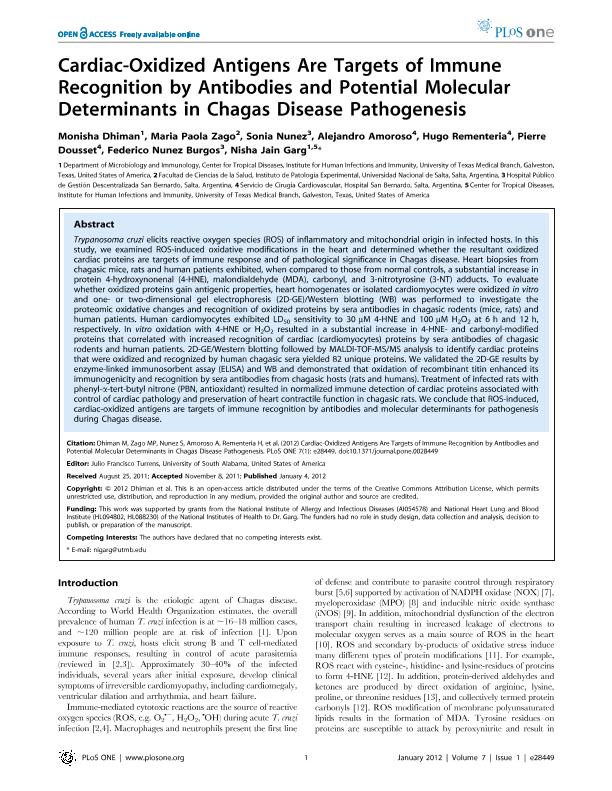Mostrar el registro sencillo del ítem
dc.contributor.author
Dhiman, Monisha
dc.contributor.author
Zago, María Paola

dc.contributor.author
Nuñez, Sonia
dc.contributor.author
Amoroso, Alejandro
dc.contributor.author
Rementeria, Hugo
dc.contributor.author
Dousset, Pierre
dc.contributor.author
Nuñez Burgos Dopazo, Federico Martìn

dc.contributor.author
Garg, Nisha Jain
dc.date.available
2016-12-14T19:15:09Z
dc.date.issued
2012-01
dc.identifier.citation
Dhiman, Monisha; Zago, María Paola; Nuñez, Sonia; Amoroso, Alejandro; Rementeria, Hugo; et al.; Cardiac-oxidized antigens are targets of immune recognition by antibodies and potential molecular determinants in chagas disease pathogenesis; Public Library of Science; Plos One; 7; 1; 1-2012; 1-13
dc.identifier.issn
1932-6203
dc.identifier.uri
http://hdl.handle.net/11336/9427
dc.description.abstract
Trypanosoma cruzi elicits reactive oxygen species (ROS) of inflammatory and mitochondrial origin in infected hosts. In this study, we examined ROS-induced oxidative modifications in the heart and determined whether the resultant oxidized cardiac proteins are targets of immune response and of pathological significance in Chagas disease. Heart biopsies from chagasic mice, rats and human patients exhibited, when compared to those from normal controls, a substantial increase in protein 4-hydroxynonenal (4-HNE), malondialdehyde (MDA), carbonyl, and 3-nitrotyrosine (3-NT) adducts. To evaluate whether oxidized proteins gain antigenic properties, heart homogenates or isolated cardiomyocytes were oxidized in vitro and one- or two-dimensional gel electrophoresis (2D-GE)/Western blotting (WB) was performed to investigate the proteomic oxidative changes and recognition of oxidized proteins by sera antibodies in chagasic rodents (mice, rats) and human patients. Human cardiomyocytes exhibited LD 50 sensitivity to 30 μM 4-HNE and 100 μM H 2O 2 at 6 h and 12 h, respectively. In vitro oxidation with 4-HNE or H 2O 2 resulted in a substantial increase in 4-HNE- and carbonyl-modified proteins that correlated with increased recognition of cardiac (cardiomyocytes) proteins by sera antibodies of chagasic rodents and human patients. 2D-GE/Western blotting followed by MALDI-TOF-MS/MS analysis to identify cardiac proteins that were oxidized and recognized by human chagasic sera yielded 82 unique proteins. We validated the 2D-GE results by enzyme-linked immunosorbent assay (ELISA) and WB and demonstrated that oxidation of recombinant titin enhanced its immunogenicity and recognition by sera antibodies from chagasic hosts (rats and humans). Treatment of infected rats with phenyl-α-tert-butyl nitrone (PBN, antioxidant) resulted in normalized immune detection of cardiac proteins associated with control of cardiac pathology and preservation of heart contractile function in chagasic rats. We conclude that ROS-induced, cardiac-oxidized antigens are targets of immune recognition by antibodies and molecular determinants for pathogenesis during Chagas disease.
dc.format
application/pdf
dc.language.iso
eng
dc.publisher
Public Library of Science

dc.rights
info:eu-repo/semantics/openAccess
dc.rights.uri
https://creativecommons.org/licenses/by/2.5/ar/
dc.subject
Chagas Desease
dc.subject
Oxidative Stress
dc.subject
Pathogenesis
dc.subject.classification
Otras Ciencias de la Salud

dc.subject.classification
Ciencias de la Salud

dc.subject.classification
CIENCIAS MÉDICAS Y DE LA SALUD

dc.title
Cardiac-oxidized antigens are targets of immune recognition by antibodies and potential molecular determinants in chagas disease pathogenesis
dc.type
info:eu-repo/semantics/article
dc.type
info:ar-repo/semantics/artículo
dc.type
info:eu-repo/semantics/publishedVersion
dc.date.updated
2016-11-17T16:03:53Z
dc.journal.volume
7
dc.journal.number
1
dc.journal.pagination
1-13
dc.journal.pais
Estados Unidos

dc.journal.ciudad
San Francisco
dc.description.fil
Fil: Dhiman, Monisha. University of Texas Medical Branch; Estados Unidos
dc.description.fil
Fil: Zago, María Paola. Consejo Nacional de Investigaciones Científicas y Técnicas. Centro Científico Tecnológico Salta. Instituto de Patología Experimental; Argentina. Universidad Nacional de Salta; Argentina
dc.description.fil
Fil: Nuñez, Sonia. Hospital Público de Gestión Descentralizada San Bernardo; Argentina
dc.description.fil
Fil: Amoroso, Alejandro. Hospital Público de Gestión Descentralizada San Bernardo; Argentina
dc.description.fil
Fil: Rementeria, Hugo. Hospital Público de Gestión Descentralizada San Bernardo; Argentina
dc.description.fil
Fil: Dousset, Pierre. Hospital Público de Gestión Descentralizada San Bernardo; Argentina
dc.description.fil
Fil: Nuñez Burgos Dopazo, Federico Martìn. Hospital Público de Gestión Descentralizada San Bernardo; Argentina
dc.description.fil
Fil: Garg, Nisha Jain. University of Texas Medical Branch; Estados Unidos
dc.journal.title
Plos One

dc.relation.alternativeid
info:eu-repo/semantics/altIdentifier/doi/http://dx.doi.org/10.1371/journal.pone.0028449
dc.relation.alternativeid
info:eu-repo/semantics/altIdentifier/url/http://journals.plos.org/plosone/article?id=10.1371/journal.pone.0028449
dc.relation.alternativeid
info:eu-repo/semantics/altIdentifier/url/https://www.ncbi.nlm.nih.gov/pmc/articles/pmid/22238578/
Archivos asociados
